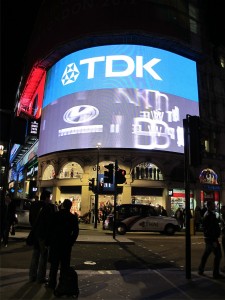Loanwords

In search of German
The growing influence of English on the German language has been the focus of previous contributions to this regular feature. We have seen that English words find easy access through modern media, music, advertising, travelling. They look and sound cool, hip and fresh. We have also seen that some words of English origin (e.g. handy, flat, beamer, public viewing) have taken on completely different meanings or have become such integral parts of the German language that they follow German grammar structures (gecancelt, downloaden, liken, die Computer (plural not ending in -s).
As both a commuter and English teacher now based in Hamburg I take an avid interest in studying poster ads and displays at bus stops/train stations and on trains and get quite a lot of inspiration for my classes. English seems to be everywhere – right in your face as it were. But what about German? Does it have any presence in English – and more intriguingly – in modern day English at all?
English does indeed have an impressive array of ‘loanwords’. Over the past 1,500 years, it has adopted words from more than 300 other languages. So what kind of German words have gained entry into English?

A large number of words borrowed from German seem to fall into the categories of philosophy, psychology, mythology, folklore, music, history and food. To name but a few there is wunderkind, zeitgeist, weltanschauung, gestalt, angst, doppelganger (a paranormal double of a living person), leitmotiv, glockenspiel, blitzkrieg, blitz (a heavy aerial bombardment), Third Reich, bratwurst, frankfurter, pretzel, strudel, muesli, spritz or spritzer (a Prosecco wine-based cocktail topped off with sparkling mineral water). Delicatessen, often abbreviated to deli, is a term meaning both „delicacies“ or „fine foods“ and thestore where this food is sold.
| German loanwords naturally appear to be more commonly used in American English, i.a. kindergarten (nursery/nursery school), gesundheit! (bless you), kaputt (broken). Some sound or look as if derived from German, e.g. schlep/schlepp/shlep (drag or haul), glitch (minor technical malfunction), klutz (clumsy person), schmuck (foolish person, stupid), shpiel/spiel (lengthy sales pitch or pick-up line) but are in fact of Yiddish origin, having entered the American English language via large Jewish communities. Interestingly, even the Cockney dialect in East London has borrowed a few words from Yiddish, including kosher (meaning legitimate) and stumm (quiet). Yiddish is, however, a Germanic language, so these loanwords may count as German.Similarly, angst is in fact a loanword from Danish (a Germanic language, too) introduced into English via existentialist Søren Kierkegaard. Unlike the German ‘Angst’, which relates to a general feeling of anxiety, the English word is used to describe an intense feeling of apprehension, anxiety or inner turmoil usually reserved for philosophical anxiety about the world or personal freedom. In teenage circles, the expression ‘teen angst’ refers to lack of confidence, fear of failure to be good at anything or to enjoy yourself, fear of rejection, fear of what lies ahead. Teen angst has been featured in cult TV series such as ‘The OC’ , ‘One Tree Hill’ or ‘90210’, and numerous articles have been devoted to it, as have been songs by French electronic band M83 and American alternative rock band Cracker.
On my quest for German words in English I come across a real curiosity when someone mentions the game of foosball during a programme on the BBC World News channel. Foosball is a table-top game that used to be a popular pastime before football video games. Curiously, foosball translates as ‘Kicker’ into German, which is in fact a word originally borrowed from English! So here we have a kind of ‘loanword swap’! Looking at my selection of German loanwords I come to the conclusion that, apart from the food words, their use is largely restricted to specialist areas or is regional. Are any German loanwords, like their English counterparts, used in advertising, as names of shops, clubs, and the like, and have any risen to buzzword status? I find the answer during a one-week stay in London in early October. There is in fact a company called Kitsch & Co. in the East of London which sells ‘Unique Gifts and Retro Memorabilia’. In a street market guide I find: ‘Its famous markets … sell everything from new and second-hand clothes to 70s music and 50s kitsch.’ While browsing the stalls of an indoor market on Brick Lane for vintage items I am handed a flyer advertising a new vintage store called ‘Blitz’. And a hairdresser’s in Barking goes by the name of Glitz &Glamour! I finally find my buzzword, too: über. Its meaning is restricted to ‘super’ or ‘very’, and while the German word has an umlaut over the u – über – the dots rarely appear in English. As a prefix ‘uber/über’ is usually attached to its adjective with a hyphen, as e.g. in ‘uber-talented individuals; uber-trendy club; switched-on, uber-connected 20-somethings; uber-rich oil companies’. I see über –with dots and hyphen – on a huge poster referring to Wifi coverage in stations along the London underground network. I’m uber-impressed. By Astrid Becker-Hemmersbach / Institute4languages
|
||
Can you spot the ‘über-‘?